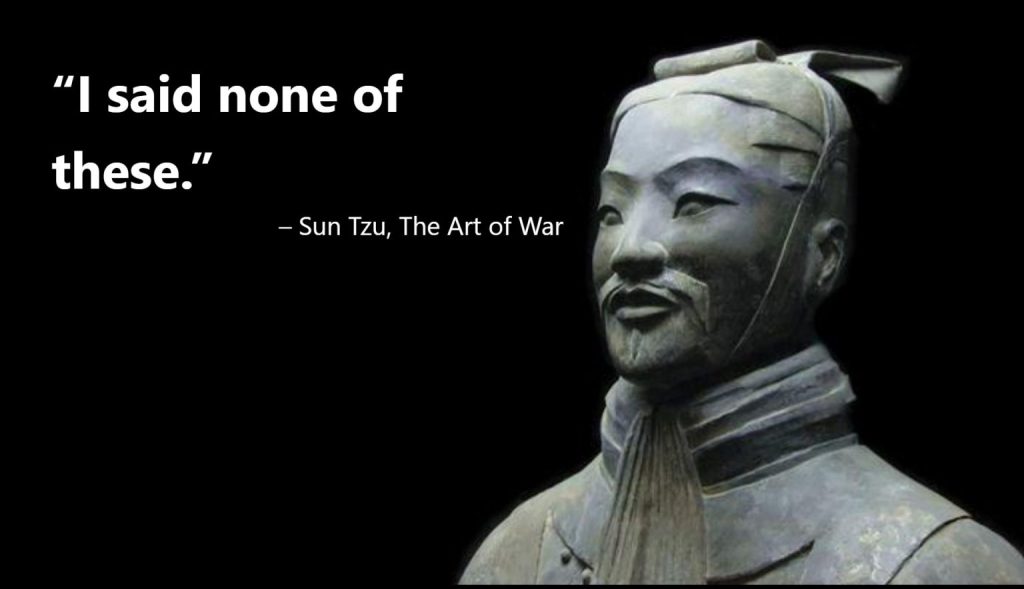
The following quotes often appear in various quotation articles or websites. Some of them are written by the author, and some come from comments made by netizens.
While these “quotes” make a lot of sense, they are not what Sun Tzu actually said in The Art of War.
Fake quotes that Sun Tzu never said
1.Even the finest sword plunged into salt water will eventually rust.
This famous saying comes from a Japanese proverb, which means “Even the best sword will rust after a long time in seawater”. This proverb is used to describe how even the best objects or talents can suffer or become less than expected if they are in an unsuitable or harmful environment.
2.You have to believe in yourself.
This famous quote in similar encouragement and sayings has existed in many cultures and time periods, but was not really said by Sun Tzu. The Art of War is a book on strategy and tactics, not a book on success, not chicken soup to warm the soul.
3.Build your opponent a golden bridge to retreat across.
This quote actually has an origin in Sun Tzu’s Art of War; it comes from the last sentence of Chapter 7. The full version on this quote is.
It is a military axiom not to advance uphill against the enemy, nor to oppose him when he comes downhill. Do not pursue an enemy who simulates flight; do not attack soldiers whose temper is keen. Do not swallow bait offered by the enemy. Do not interfere with an army that is returning home. When you surround an army, leave an outlet free. Do not press a desperate foe too hard. Such is the art of warfare.
4.If the mind is willing, the flesh could go on and on without many things.
This famous quote is from the work of the ancient Roman philosopher Seneca the Younger, one of the leading figures of the Stoic school of philosophy (Stoicism) in ancient Rome. The original text of this famous quote is:
” Mens sana in corpore sano.”
A direct translation into English is: “A healthy mind in a healthy body.”
This quote emphasizes the close connection between the health of the body and the health of the mind, expressing the importance of a healthy body and a healthy mind.
5.Opportunities multiply as they are seized.
This famous quote is from Cicero, an ancient Roman statesman, military man and philosopher, who wrote the following:
“Facilius est multa facere quam diu.”
This famous quote emphasizes the importance of seizing opportunities, implying that when you seize an opportunity, more possibilities and opportunities arise.
6.Wheels of justice grind slow but grind fine.
The phrase is often attributed to various sources, including ancient philosophers and legal traditions. Its origins may be challenging to trace precisely.But there is no such mention in THE Art of War.
7.If you wait by the river long enough, the bodies of your enemies will float by.
This phrase does not appear in the official text of The Art of War. It may be an explanation or interpretation that emphasizes patiently biding one’s time rather than directly chasing the enemy in anticipation of seeing their defeat or difficulty.
8.The Art of War is self-explanatory.
“The Art of War is self-explanatory” is a statement indicating that the principles and teachings found in “The Art of War” are clear, straightforward, and easy to understand without requiring extensive explanation.
9.I have heard that the ancients used bows and arrows to their advantage.
The phrase has no meaning.
10.Plan for what it is difficult while it is easy, do what is great while it is small.
In fact, this is what Lao Tzu said.
I hope The Art of War can provide some food for thought for everyone, but these fake quotes misunderstand Sun Tzu, and in turn mislead readers, preventing people from getting the real thing.
If you are interested in The Art of War, you can spend an evening reading this very short book on this website so that you will understand Sun Tzu’s strategies and ideas more realistically.
Before reading the entire book, you can start by reading real Sun Tzu’s quotes, each with its place in the book noted.
Extended reading
The Art of War Summary by Chapter